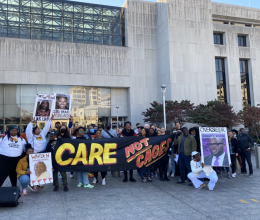
Statement on behalf of the
American Civil Liberties Union of the District of Columbia
before the
DC Council Committee on Judiciary and Public Safety
Public Hearing on
Bill 22-0021, The “Sexual Abuse Statute of Limitations Elimination Amendment Act of 2017,” and Bill 22-0028, The “Childhood Protection Against Sexual Abuse Amendment Act of 2017”
Thursday, June 15, 2017
11:00 am
presented by
Monica Hopkins-Maxwell, Executive Director
Good morning, Councilmember Allen and members of the Committee. My name is Monica Hopkins-Maxwell and I am the Executive Director of the American Civil Liberties Union of the District of Columbia (ACLU-DC). I present the following testimony on behalf of our more than 19,000 members in the District.
The ACLU-DC strongly opposes “The Sexual Abuse Statute of Limitations Elimination Act of 2017” (Bill 22-21) which, if enacted, would eliminate the criminal statute of limitations for all felony sex offenses in the District of Columbia. Bill 22-21 would subject defendants to potential prosecution for any accusation of an alleged felony sex offense during their entire lifetime, even if the accusation dates back several decades.
Statutes of limitations are a critical component of the American criminal justice system. They serve the vital purpose of “protect[ing] individuals from having to defend themselves against charges when the basic facts may have become obscured by the passage of time and to minimize the danger of official punishment because of acts in the far distant past.[1]” They allow both the prosecution and the defense to present a case before the evidence gets stale and they help ensure that individuals accused of a crime have a fair opportunity to defend themselves. As more time lapses between an alleged commission of a crime and the prosecution, it becomes increasingly difficult, if not impossible, for the accused to prepare a meaningful defense and provide exculpatory evidence – memories fail, witnesses die, and records are lost.
The potential consequences for innocent persons who are falsely accused of these crimes are devastating. Accusations of sexual abuse require no physical evidence (particularly if made years after the alleged act), and have the potential to inflame the passions of a jury in a way that most crimes do not. Particularly with cases involving sexual assault of a minor, a jury is more likely to presume that a defendant is guilty or s/he would not have been charged.
The consequences of sex-offense convictions can also be permanently damaging in the way that convictions of other crimes may not be. In addition to being subject to potential incarceration, those convicted of sex offenses face a lifetime on the sex offender registry and are severely limited in their ability to reintegrate into society. Statutes of limitations help protect the rights of the accused from wrongful convictions that would lead to these devastating consequences.
The ACLU-DC recognizes the very difficult issues raised by Bill 22-21, including the great time and pain that it sometimes takes for a victim to truly grasp what has happened. Sexual abuse against anyone, particularly children, is despicable and victims are often, for a variety of reasons, unable to come forward immediately after such abuse has taken place. Our opposition to this bill is not intended to diminish the courage of crime victims to come forward in support of such bills. However, we oppose this bill, as we have with similar bills that have come before the DC Council in the past, because of the important safeguards that a statute of limitations provides to the accused, particularly those who are innocent of the crime.
In considering similar legislation in 2004, the DC Council balanced the interests of protecting victims’ rights and prosecuting crimes against upholding the rights of the accused, by suspending the statute of limitations for sex offenses against children until the victim reached 21 years of age and by extending, but not eliminating, the statute of limitations for the most serious sexual crimes against children[2]. In passing Law 15-356 in 2004, the Council acknowledged the danger in completely eliminating the statute of limitations. The more steps we take to extend the statute of limitations or eliminate it altogether, the greater the barrier to justice that the accused must face.
The ACLU-DC also urges the Council to reject the “Childhood Protection Against Sexual Abuse Amendment Act of 2017” (Bill 22-28), which would eliminate the statute of limitations for civil suits by persons seeking damages arising out of alleged childhood sexual abuse and would allow individuals who are currently barred by a statute of limitations a two-year period to bring their claims. Under current law (DC Code 12-302), the statute of limitations for civil claims by persons under 18 years of age is suspended until they reach 18, after which they still have three years to bring their civil case. The shortness of the statute of limitations for civil suits in comparison to the statute of limitations for criminal suits reflects the community’s judgment that it is more important to preserve criminal claims than civil claims. For some of the same reasons we’ve outlined above about the collateral consequences for innocent people who are accused of committing sexual abuse, and the difficulty in preparing a defense when significant time has passed between the alleged act and when a claim is brought, we do not see a justification for eliminating the statute of limitations for civil claims.
[1] Toussie v. United States, 397 U.S. 112, 114 (1970)
[2] Law 15-356 [DC Code 23-113(d)(2)] was passed in November of 2004 after the Council considered and rejected a proposal to eliminate statutes of limitations for all felony sex offenses. Under this law, the statute of limitations for first- or second-degree child sexual abuse and for enticing or using a minor in a sexual performance is suspended until the alleged victim turns 21, after which the statute of limitations was extended to 15 years for first- and second-degree child sexual abuse and 10 years for enticing and using a minor in a sexual performance. In 2007, the Council rejected Bill 17-146, which also proposed to eliminate the statute of limitations for all sex offenses.


